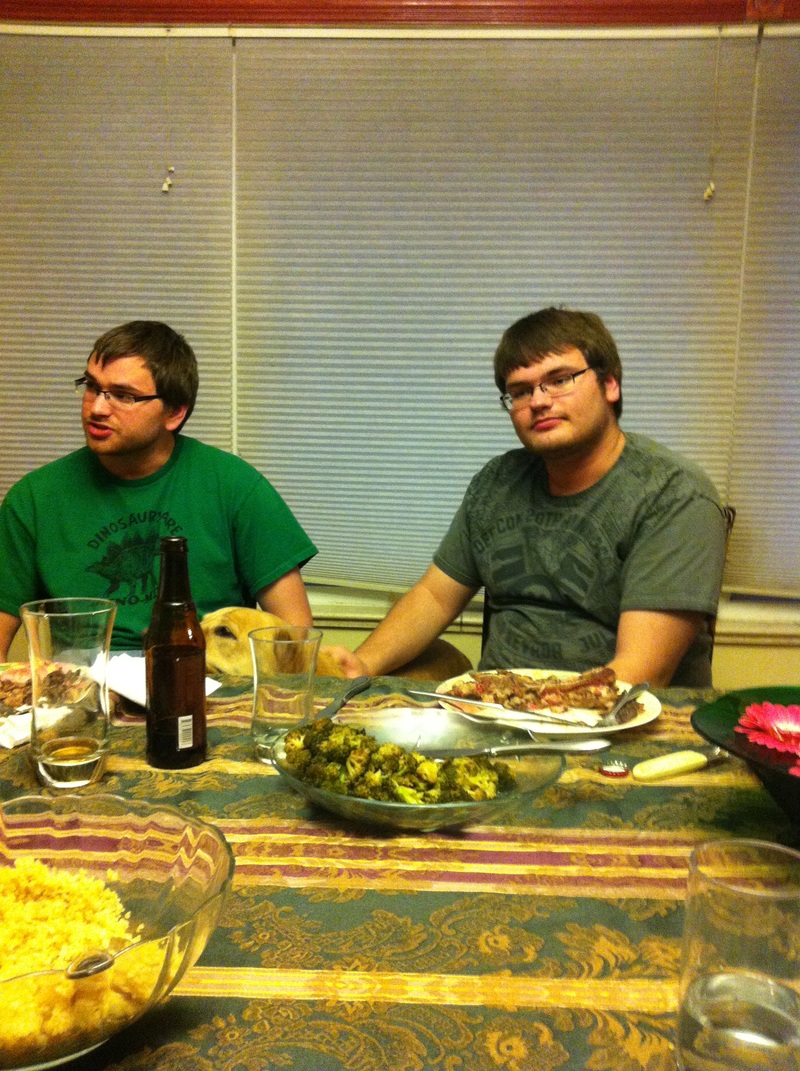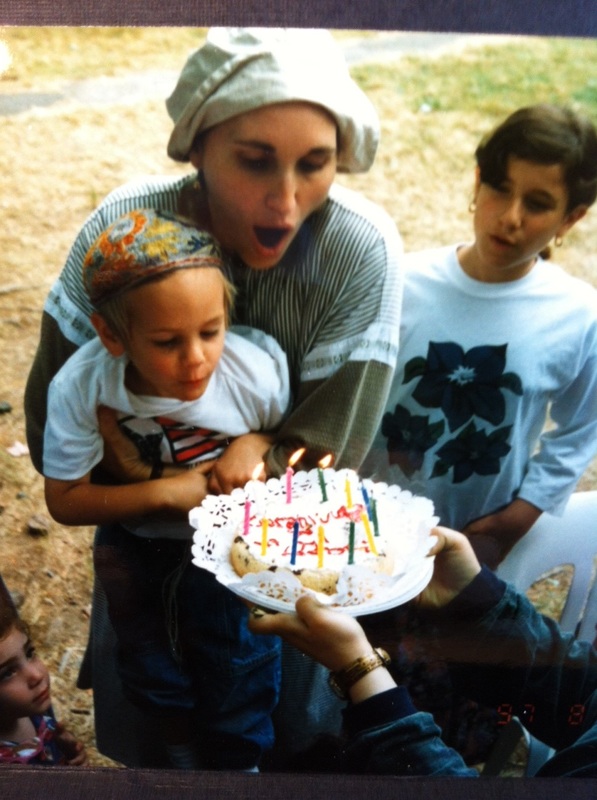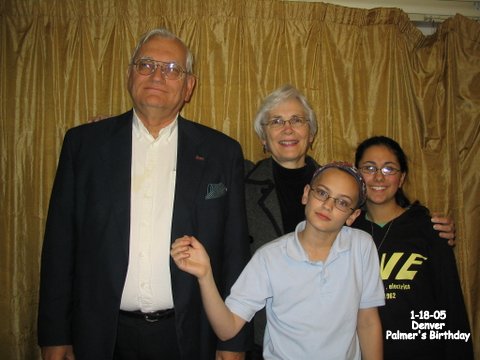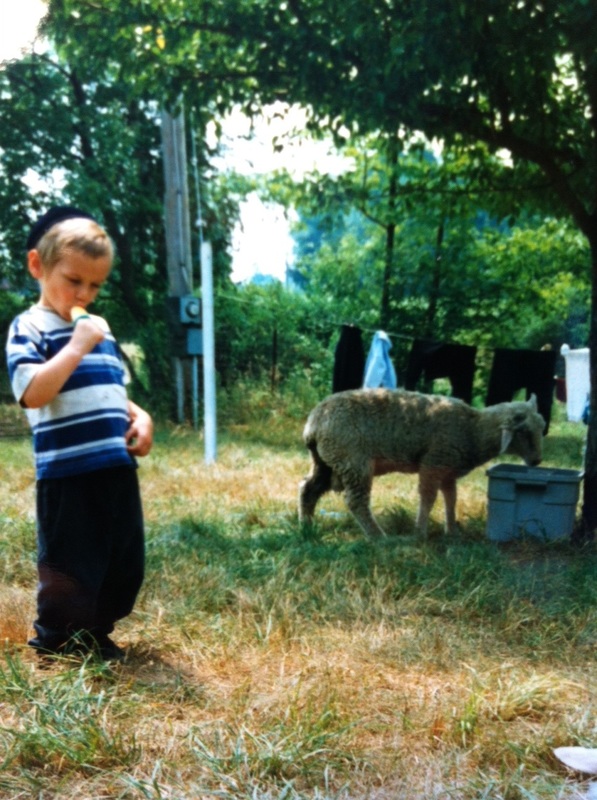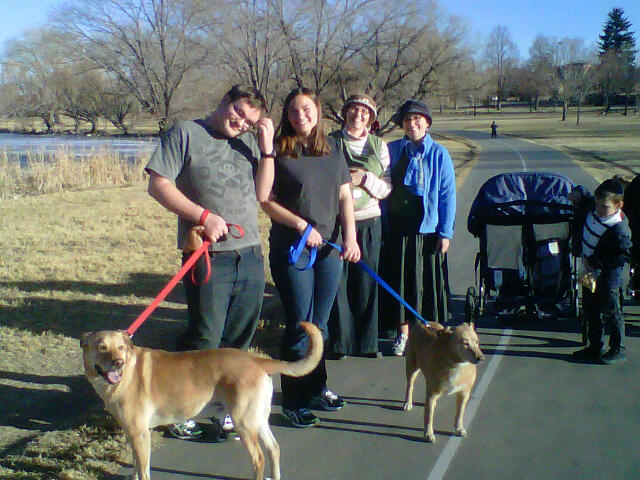|
To see the below article on Aish.com click here. A copy of the print version as it appears on Aish.com is below.
2 Comments
Sahra holding newborn Doni
Smiles are a bridge between two hearts. When you smile at another, you recognize his humanity, you signal that she matters, you lift moods, you actually brighten the world. Our face, and our expression, is an important part of others’ environments. We spend most of our time looking out of our face, while those we encounter are looking at it. Accordingly, Jewish law teaches us that a pleasant face is our social responsibility. In Pirkei Avos (1:15) Shammai says: Receive [greet] every person with a “sever panim yafos”. Sever Panim Yafos is often translated as “a pleasant countenance”. Receive [greet] every person with a pleasant countenance. Practically that means with a smile. Smile at people when you greet them. R’ Avrohom Grodzinski (1883-1944) embodied this teaching. He spent hours practicing his smile in front of a mirror and worked for two years on greeting others pleasantly, even during the darkest days of the Holocaust. But smiles are not just good for others; they are good for you too. Smiles reduce stress and enhance the immune response. They make you look younger and more attractive. Smiling releases endorphins and serotonin, elevates the mood and keeps you happier. And, smiles are contagious, they light up the world. Like a candle, a smile can light many lights without itself being diminished. If you smile at 5 people, and they pass the smile on to 5 people and they pass it on to 5 more… then by the 15th passing on, you have smiled at the whole world J. So, greeting every person with a smile is healthy advice. But the mishna is not advice, it is law. In the Vilna Gaon’s commentary, he connects each law in the mishna to its source in the Torah. The law of greeting with a smile is rooted in the blessing that Yaakov Avinu gives his son, Yehudah. “His eyes shall be red with wine, and his teeth white with milk” (Gen. 49:12). The Talmud (Ketubos 111b) reads the verse this way, “The Jewish people said to the Almighty, ‘the smile of Your eyes [to me] is more savory than wine, and the white of Your teeth [when you smile] is more delicious than milk.’” R' Yochanan therefore teaches that smiling at another is greater than giving him a glass of milk. So, smiling is nourishing. Then why not just command us to give a glass of milk to every one we greet? Of course, receiving a smile is a different kind of nourishment. We can see this from looking at the words more closely. Receive (kabel) every person with a sever panim yafot. “Kabel” v. Receive. Accept. Take in. When you see a person, take them in, accept them for who they are. Each of us is a mixture of good and bad, easy and hard. Every person deserves to be accepted with pleasantness. What if you don’t know them, or like them? What if you dislike them? Do what Yaakov did when he blessed his children: look deep inside each one. Uncover that which is unique and special. Use your “Sever”, your sevarh, your thoughts and intellect, to find what’s good inside. Look for the “P’nim Yafos”, their inner goodness. Everyone has some. Shammai is telling us to find it, connect to it, and respond to it, with an affirming, accepting, tooth sparkling smile. Your white teeth are more delicious than milk! As a zechus/merit for the neshama of Daniel Moshe a”h ben Ephraim Adam HaLevi, please consider smiling more often. And as you do, see if you can look past the outside, past the parts of a person that are hard for you like. Take an extra moment and seek out the p’nim yafos, their inner goodness, and build a bridge from your heart to theirs. with thanks for ideas from R’ Tzvi Mordechai Feldheim and R’ Jonathon Ghermezien https://www.chazaq.org/?section=articles&categoryId=24&articleId=448 Here is Grandma Oralee's story and photos of her month in the wilderness with Doni. The text was not readable when I tried to drag the whole document onto this page, but if you click below and download the file, you should be able to see the whole thing clearly.
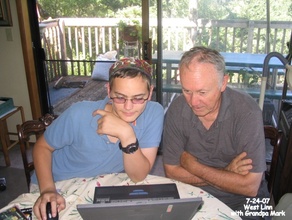 Doni was very generous and patient with his grandparents. He used his growing computer knowledge to help us make decisions about what to buy and how best to use it during visits and phone calls to New York to his father’s parents and to Oregon to his mother’s parents. He was our computer guru. His enthusiasm for new technologies was contagious. We also served as additional “labs” for his self-directed computer education which started on all the computers at home in the Bulow household. He stood on his father’s shoulders. Ephraim is well versed and adept with computers and served his law firm with his computer expertise. Doni’s innate interest in “how things work” led him to take apart and examine any electronic device the family hadn’t used in the previous few hours. He was not intimidated by complexity. Rebuilding them was another challenge he tackled in his self education. “Why are these four screws still on the table?” Grandpa Mark Beach has these memories: “When Doni was 15 and in Oregon for a few days in the summer. I took him to a huge warehouse full of electronic waste – boxes and bins stuffed with keyboards, mice, hard drives and monitors. He couldn’t believe all those treasures were really waste, especially the processors. He’d look in a bin, identify the good ones and beg the manager for an arm load. We were astounded at his skills, just as the geeks later that day at the computer repair shop were astounded. He could have had a summer job on the spot. “During the last six months of his life, we spent hours on the phone assessing my digital needs and specifying new systems and techniques to meet them. In addition to appreciating Doni’s help, I always felt amazed at his instincts about, for lack of a better term, customer service. Yes he often got ahead of my technical understanding. But mostly he asked the right questions about what I expected from computers and software. Occasionally I got ahead of him regarding the future of digital capacities. He’d have new insights ready for our next phone call. This was especially true regarding solid state printing, a field that we both found fascinating because of its investment opportunities. “Uri’s eulogy for Doni fit my own outlook. Our bodies die, but the fact that we once lived makes us immortal. Doni helped me find my way to more rewarding capacity in my relations with my community, so I will think of him every time I use techniques he helped me develop. I won’t be able to look at my computer screen or organize my files in the cloud without hearing his voice. And long after I’m gone, my community will benefit from Doni’s life because of how he helped me prepare what I collected and left behind.” With all of his projects and passions, hugs and laughs, it was hard to reconcile Doni’s desire to get off the planet. From the age of five he told me that “he never asked to come and he didn’t want to stay.” It was difficult raising a child who didn’t want to wake up the next morning. For years I tipped toed downstairs each morning and peered with trepidation around his door to see if he was breathing or not.
Doni had bi-polar disorder as well as Asperger’s syndrome. He was brilliant and quirky and often unpredictable. School often got in the way of his education, especially in the early years. He carried a lot of scars from being misunderstood by teachers and classmates alike. Those frustrations were part of his leaving Jewish practice and thought behind before he reached bar-mitzvah. Switching to Denver Academy, a private secular school for kids with learning differences, gave him a new lease on life. He blossomed there, and his talk of life not being worth living became just a background note in a symphony of other conversations and interests while he was there. He graduated high school last spring and the note became louder. He and I talked about it often, throughout his life, and certainly lately. We were very close and very open. He shared almost everything with me. He told me that had done a cost benefit analysis and saw that there was more pain than pleasure in the world and that it just wasn’t worth it to stay. Since Doni was Atheist, there was no Jewish insight I could share with him that would make a difference. We read together about “reasons to live” online. None of them persuaded him. He was not in a moment of despair; he was living in a lifelong pain from which he was desperate to find relief. Of course we had seen many doctors and tried many drugs, but none seemed to be effective over the long term. Although I knew the threat was real, I lived with a measure of denial as I was ever hopeful that he would grow up and grow out of it, at least enough to grow into a productive and meaningful adulthood. Doni had so much potential, it was hard for me to understand that each opportunity felt like a burden to him and that the more potential he had the less he wanted to actualize it. I am not sure why he chose to leave the day that our “adopted” son Avraham was getting married, but that was the day he chose. I stayed up late Saturday night getting ready to leave to Monsey, NY for his wedding early in the morning on Sunday. As I was sending emails at 1:30 am, Doni asked me why I was up so late and told me that I really should go to bed, that I needed my sleep. We smiled because he was right and said good night. I went to bed at 2 am and at about 2:10 I heard a loud noise. Ever worried, I flew downstairs to see what it was and there was Doni, unconscious, and breathing belaboredly. I knew he had poison in his possession, and instantly I understood what he had done. I woke up Ephraim and called 911. The operator told me to begin mouth to mouth resuscitation. I told her I couldn’t because he had likely swallowed poison and I didn’t know how lethal it was or if there were traces on his mouth. She yelled at me and told me that I might be able to save his life. I told her that I just couldn’t risk my own to do that. I knew how serious he was… by then Ephraim was there and he started chest compressions until the paramedics arrived. I felt relieved when I saw the lights, the uniforms and the medical kits of the paramedics. They must be able to make it better; it couldn’t really be that this was the day I dreaded for 14 years. They took him to the hospital and a whole team worked on him for hours. I said tehillim, but I didn’t know what to ask for. I knew how much Doni wanted to go and I knew how much I wanted him to stay. I just davened and left it up to Hashem to decide. Avi and Gitty met us in the emergency room and Uri drove down from Boulder. He told the doctors what kind of poison Doni had and they tried an antidote to that. They had been trying for 2 hours with little luck to get Doni’s blood pressure back up into a normal range, but he did respond a bit to the antidote. They gave him another round and then another when finally his blood pressure responded and they decided to put him in the pediatric ICU. That was a welcome sign of hope. On the way upstairs, they did and MRI of his head. We waited for them in the PICU. Aviva arrived. After the MRI, the doctors came to us and explained that there had been so much brain damage in the rescue attempt (long term low blood pressure equals diminished brain function, restoring normal blood pressure equals bleeding into the brain) that there really was nothing left to save. We called Elisheva and she came to the hospital as well (I so didn’t want to call her until I knew more, she had been through enough sorrow this year). They kept him on the machines until the rabbi arrived to give the final ruling that they did not have to try further. We hugged him and kissed him and said our goodbyes and sobbed on each other’s shoulders. We called Sahra in Detroit and our parents and we sat there in disbelief as we planned a funeral for our 19 year old. 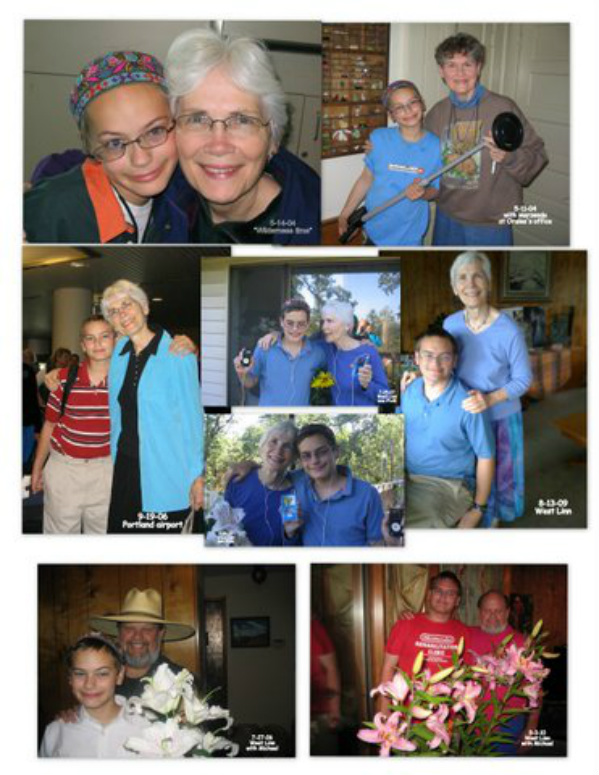 June 5, 2013 Dear Family and Friends, Early Sunday morning, May 19, Aliza called me in Sunriver from Denver Health to tell me that Doni had taken poison, was unconscious and would not live. The family was at the hospital and had said their final words. Sari took Aliza’s phone back into Doni’s room so I could tell him how much I loved and treasured him. In Orthodox Judaism, burial is done the same day before sundown. Harry and I drove the 4 hours to the Portland airport and then flew to Denver. We arrived at the cemetery at 7:30 pm just after his service ended. We joined the family hugging them one by one near the grave, all of us in deep grief. I had been in Denver the previous week, May 8-13, for Uri’s graduation from the University of Colorado. During my visit Doni engaged our long and loving connection with each other. He easily fixed a problem on my lap top while telling me I needed to update my hardware. He was excited about treating me to a gluten free pizza lunch at Udi’s cafe; showing me one of his favorite movies, Across the Universe; playing songs he appreciated; and, inviting me to join his computer geek’s chat room for an interview with a favorite author. I returned from that visit with old concerns but new hope as I took the plunge into his chat room on the 15th and witnessed the camaraderie among the members. Just days later, Harry and I were staying with the Bulows. They followed the Jewish tradition of “sitting shiva.” -- seven days of staying home, doing nothing of the normal routines of life, while people came to mourn with the family. Three meals a day were brought by community members. The men of their synagogue came to the house for morning and afternoon/evening prayers each day. Others in the community visited, took care of daily needs and housekeeping. Doni’s school mates, friends and teachers came. Family and friends flew in from around the country and Israel to spend a few hours to several days with them. This ritual container for grief allowed for a deepening and rich process while memories, stories and perspectives were told with ready tears and sometimes, laughter. The caring of the community and the love in the family was palpable. A fuller sense of Doni in his complexity, humor, wonder, helpfulness, computer genius knowledge and interior pain emerged. His mind contained brilliance and illness. Hopefully we will learn more about the functioning of the brain to help people so troubled that the only option they see to end the pain is to end their life. Hopefully we can reach out to others with compassion and kindness as they deal with family members or themselves living inside complex, unquiet minds which few of us can understand. Hopefully Doni’s life and death can open doors for discussions and help requested and given to those in need. This is what we can do for each other as we hold the preciousness of each day of life. With deep gratitude for your loving care and prayers, Oralee Doni had friends all over the world. He created an invitation only chat room to introduce them to one another and to help make his individual friends into a community.
Because he so resonated with the books of author Cory Doctorow, Doni used the name of one of the key characters as his online name: Winston, or spelled in leet speak: W1n5t0n Doni's online friends made a memorial website for him: http://w1n5t0n.net/ We made Doni's funeral at 6:30 pm so that Sahra could arrive from Detroit in time. My mother and her fiancé, as well as three dear friends from Long Beach, Tina and Uri Lemberger and Marilyn Hazan Corwin, met us at the cemetery just after the burial.
When I finally went to bed Sunday night, I realized I had been up since Shabbos morning as I didn’t sleep at all Saturday night. It was a good thing. I don’t know how I would have slept otherwise. Shiva, the seven days of mourning, was the longest week I ever lived. Each day was so full and so long and so sad. Baruch Hashem we were inundated with visitors, friends and caring community members, but we had no quiet family time to process. Ephraim is an introvert, so just spending so much time in the company of others was a strain for him, and I felt a need to let people know who my son was. He was not known by many in the community and I didn’t want him to be remembered as that Bulow kid who killed himself. I wanted him to have a personality in their eyes. On the second day of shiva, the third day of our sorrow, Ephraim and I both woke up dreading the day to come. As Ephraim shared his feelings with me, he said, “If Doni felt like this every day when he woke up, I can understand better why he did what he did.” I thought about that during the day. There were times, as we talked about Doni, that we told jokes and laughed. We ate food and added salt, so clearly we had flavor preferences. We hugged others and asked about their welfare, and yet, all day long we were crying inside for Doni who we loved and missed so much. I got a little insight into how one could enjoy some parts of life and yet still be in so much pain that you wish the day would be over. Each one of us, mother, father, sisters, brothers, grandparents, is mourning in our own way. We all lost the same person, but since we all had our own relationship with him, we all lost a different part of ourselves. We can all offer hugs and love to each other for the journey, but really the journey is alone and lonely. Each one of us needs to figure out on our own how to build a new life and a new family without him. We are working with the concept that Doni was not a 120 year gift that was cut short, but rather a 19 year gift that we truly appreciated. In his kindness, Rabbi Cahan said that he may have even been a 14 year gift that we got to keep longer because of the work we did with him. Doni was number 6 after several kids with a variety of learning, attention, emotional and sensory issues. I thought maybe something I learned from raising them would apply to him, but alas, he was a whole new workshop. Here is what I posted the day after his death: My darling Doni was a question mark, wrapped in an enigma, surrounded by a mystery. He kept me wondering, wishing and growing. He was a challenge and such a gift. His question mark became a period. Hashem natan, Hashem lakach. Yehi shaim Hashem mivorach.* *G-d gave and G-d took. May G-d’s name be blessed. Ephraim related that if, when we had five children and we were considering a sixth, Hashem would have said to us, “I’ll give you a sixth, but he’ll be mentally ill and he’ll take his own life when he is 19. Do you still want him?” We would have probably said, “No, thank you! We’ll stick with five.” But now that we had Doni, we have been so enriched. We are very thankful for his life and for what we have gained through spending those years with him. As difficult as many times were and as profoundly sad our loss and his end is, we are grateful and would not have traded the experience. 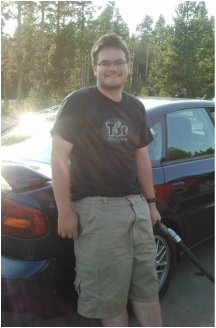 Doni on our Yellowstone trip August 2012 Doni on our Yellowstone trip August 2012 Doni was full and fun, challenging and charming. He loved his family and we all loved him. For a teenage boy, he was quiet a cuddler. He shared regular hugs and kisses, always answering “love you” with “love you more!” He loved to learn and spent hours a day listening to books and lectures, or watching videos and classes. He particularly enjoyed learning about science and computers. He watched the chemistry lectures from Oxford University, scientific raps like this one: http://www.youtube.com/watch?v=h7tXFgx9Xh0 and he loved the Symphony of Science songs featuring some of his favorite scientists: http://www.youtube.com/watch?v=XGK84Poeynk. He enjoyed TED talks and often shared them with me. It is through Doni that I learned about Kahn Academy http://www.youtube.com/watch?v=gM95HHI4gLk and began to think about how we could apply some of that to Jewish educational initiatives. Doni also loved music from across the spectrum. He loved the Beatles and through learning more about them came to enjoy the music of Ravi Shankar as well: http://www.youtube.com/watch?v=4gWCiLexilY He liked classical, heavy metal and country music too. One of his favorite country artists was Brad Paisley: he liked his Cigar Song (very ironic), Whiskey Lullaby (very sad) and Ain’t Nothin’ Like http://www.youtube.com/watch?v=n38hPHTsrDk He also liked to sing karaoke and would often convince us to sing along with him. He liked to sing “A Whole New World” from Aladdin with me: http://www.youtube.com/watch?v=QIgOkaQBB6s . Even if we didn’t sound very good singing together (it’s hard to sing on key with karaoke!), we did have a good time and I often did feel like he showed me parts of whole new worlds. Besides sharing with me the worlds of computers (I now use two screens, have a mechanical key board, run Cyanogen mod on my android phone, and am accustomed to an extremely speedy ad free [Yeah AdBlockPlus! http://adblockplus.org/en/firefox]) internet experience), he also introduced me to Dr. Who, Futurama, Thirty Rock and The Hitchhiker’s Guide to the Galaxy. In case you are wondering, the answer is 42. Doni enjoyed working with food. He made his own yogurt and specially adapted a fish tank heater to create a larger incubator out of a picnic cooler so he could make 4 quarts at once. He experimented with pickling and cheese making and he perfected sourdough bread making. He learned how to capture our local Colorado yeasts (https://stellaculinary.com/podcasts/video/how-to-make-a-sourdough-starter-video-recipe ) and would sometimes spend a whole week fermenting a dough to make the perfect loaf. Lately he was on a jalapeno kick, often I’d have to go outside to breathe when he was busy chopping and cooking as there would be so much capsaicin in the air that it hurt to inhale. After frying several batches of Jalapeno Poppers, he learned to bake them to delicious effect: http://www.foodnetwork.com/recipes/emeril-lagasse/baked-jalapeno-poppers-recipe/index.html . He loved macaroni and cheese (from scratch of course!). He even made his own noodles upon occasion, and he loved to make it rich with way too much cheese and cream instead of milk. Doni prided himself in being a geek, a science and computer whiz, and he founded a business Geeky Wizard (geekywizard.com) for computer assistance and repair. He was a strong proponent of open source software http://en.wikipedia.org/wiki/Open-source_software and was very excited about how the open source concept might apply to other areas (http://www.ted.com/talks/marcin_jakubowski.html and http://www.ted.com/talks/jay_bradner_open_source_cancer_research.html). He was also passionate about freedom of speech and freedom of access to information and supported the EFF, Electronic Frontier Foundation (https://www.eff.org/) . With some of his Geeky Wizard earnings, he bought a server and set up a special proxy site that would allow Chinese and Iranian dissidents a route to bypass government censorship and gain free access to the internet and the information therein. That made me nervous, especially after he turned 18… every time I’d see a police car slow down in front of our house, I’d worry that the Chinese police had finally caught up with him. But, he assured me that he routed it through Bulgaria, among other countries, and there was no way anyone could trace it to our address... so far, no one has. |
NOTE TO READER:
The first post is on the bottom of the page. Please start reading from the bottom if you want to see the posts in chronological order. Doni Musings
A mother's thoughts about the life and death of her youngest son: Doni (Daniel Moshe) Bulow. |
||||||||||||
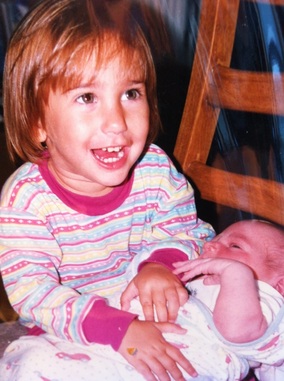
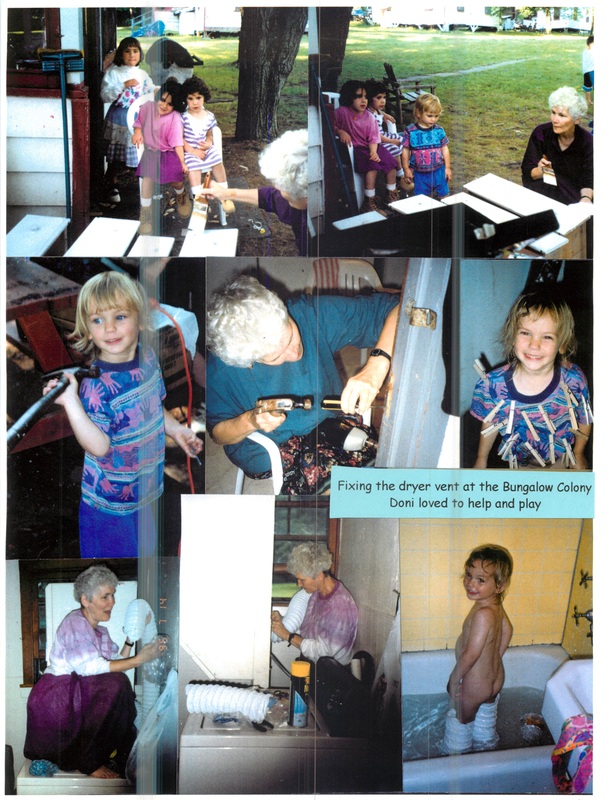
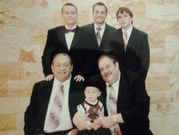
 RSS Feed
RSS Feed
